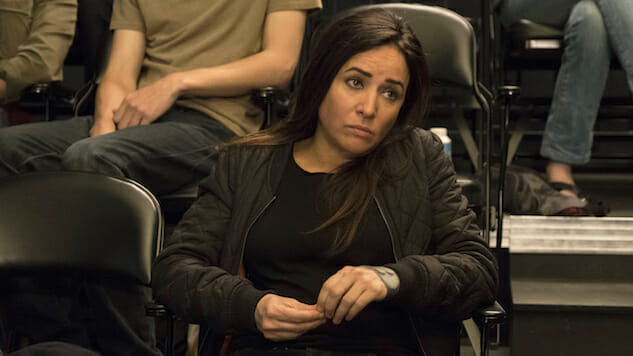“Sam demands satisfaction” is the entire logline for “Eulogy,” and from that declarative sentence it plunges into her life—the high diver leaping off the edge of the platform, performing remarkable feats with apparent ease. It is autobiographical, like Better Things as a whole: As with her character, Sam Fox, series creator, director, co-writer and star Pamela Adlon has spent her life acting, making things, putting herself out there, accomplishing some things, too. It is at once naturalistic—defying the rhythms of fiction—and fantastical—embracing them tighter: In one sequence, Sam cuts short the story of the worst job she’s had to return to an anodyne car commercial; in another, her children and her closest friends hold a “funeral” for her, replete with old photographs and those cheap plastic “candles.” More than any of this, though, “Eulogy”—dedicated to the late Robert Michael Morris (The Comeback)—is a moving, keenly observed appreciation of working actors, of their challenges and their craft. “Eulogize me,” Sam orders at one point, though her own satisfaction is only part of the purpose: Here, Better Things’ exceptional second season offers a tribute to her tribe.
The episode’s structure is similarly audacious, each of its four discrete segments shading in a portion of the picture. The first, set at Sam’s acting class, shifts back and forth between a scene workshop and the students’ exercises, tracing the line—the one Better Things blurs—that separates realism and reality; as Sam sagely advises a young actress, perhaps seeing herself, “toughen up in life, and get weaker in the scenes.” She’s wise, yet not resigned or resentful. She’s an unstinting critic, yet still a generous one, honestly explaining, for instance, that there’s nothing to be gained from complaining about the writing. The camera soon circles the room, rambling from face to face, as Sam’s students, rapt, listen in for the line that might well sustain them. And, this being Better Things—a series allergic to bad writing—she delivers. “People are weak,” she says:
They’re not cool and fast. What are your assets as an actor? Your weaknesses. Whatever your fears are, whatever you suck at, that’s what you gotta tap. That’s what people want to see when you’re playing people. They want to see you at your weakest. They don’t want to see some asshole comedian show off. They want to see him fail. That’s acting.
“Eulogy” is not cool, nor fast. It’s full of fears, of disappointments, of failures: the interminable car commercial shoot, with Sam’s endless variations of intonation, emphasis, gesture, expression on a single, throwaway question (“Can I drive now?”); the swift cruelties unleashed by Frankie (Hannah Alligood) and Max (Mikey Madison); the rueful remark Morris utters in that brief, pungent scene at the bar, saying “nobody could be openly gay until I was too old to have any fun.” The episode admits that much of the work, for an actor, is not glamorous—that it’s work, with all the fatigue and frustration that entails, and that those we call “character actors,” standing in the shadow of the stars, are rarely appreciated until they’re already gone. Morris’ presence, like a ghostly visitation, is a wrenching reminder that the dead don’t hear eulogies: It made me wish I’d written more, and more effusively, when he was still with us, that I’d discussed his turn as Mickey Deane in two seasons of The Comeback in the appropriate terms—as one of the most devastating comic performances of the century.
Of course, as the episode’s dedication to Morris suggests, and as the eulogies of “Eulogy” render in such graceful fashion, actors are not simply the vessels for other people’s lives. They are, in my own case, friends and former roommates; I remember the working actor to whom I’m closest practicing vocal techniques in the bathroom mirror, but I also remember reading him short stories I’d written, trading tales from the day on a Los Angeles balcony, standing on a hilltop somewhere in San Francisco, catching up, reminiscing, appreciating more than what one sees on stage, or screen. They’re the people we meet for a drink when we storm out of the house, mothers and daughters and maybe ex-wives, carriers of pain, sharers of memories, pace cars.
These last descriptions come from the ending of “Eulogy,” in which Sam’s “big gay husband,” Rich (Diedrich Bader), dressed as Death—aluminum foil scythe included—officiates her “funeral,” a sequence that cycles through humor, pathos, daring, charm. (Rich lightens the mood with a needling homage, and the line of the episode belongs to Sam’s youngest, Duke, played by Olivia Edward: Having pretended to be dead alongside her mother, she sits up and cries, “Nobody said anything about me!”) Though it’s inspired by Sam’s need for appreciation as an actor, then, “Eulogy” ultimately focuses on why she deserves appreciation as a person. After all, Frankie’s watched everything she’s ever been in and Max has watched nothing, yet both arrive at the same tearful conclusion: That the time to pay tribute to those we love and appreciate is always, no question, right now.
Better Things, which has now been renewed for a third season, airs Thursdays at 10 p.m. on FX. Read Paste’s profile of series creator Pamela Adlon here.
Matt Brennan is the TV editor of Paste Magazine
. He tweets about what he’s watching @thefilmgoer.